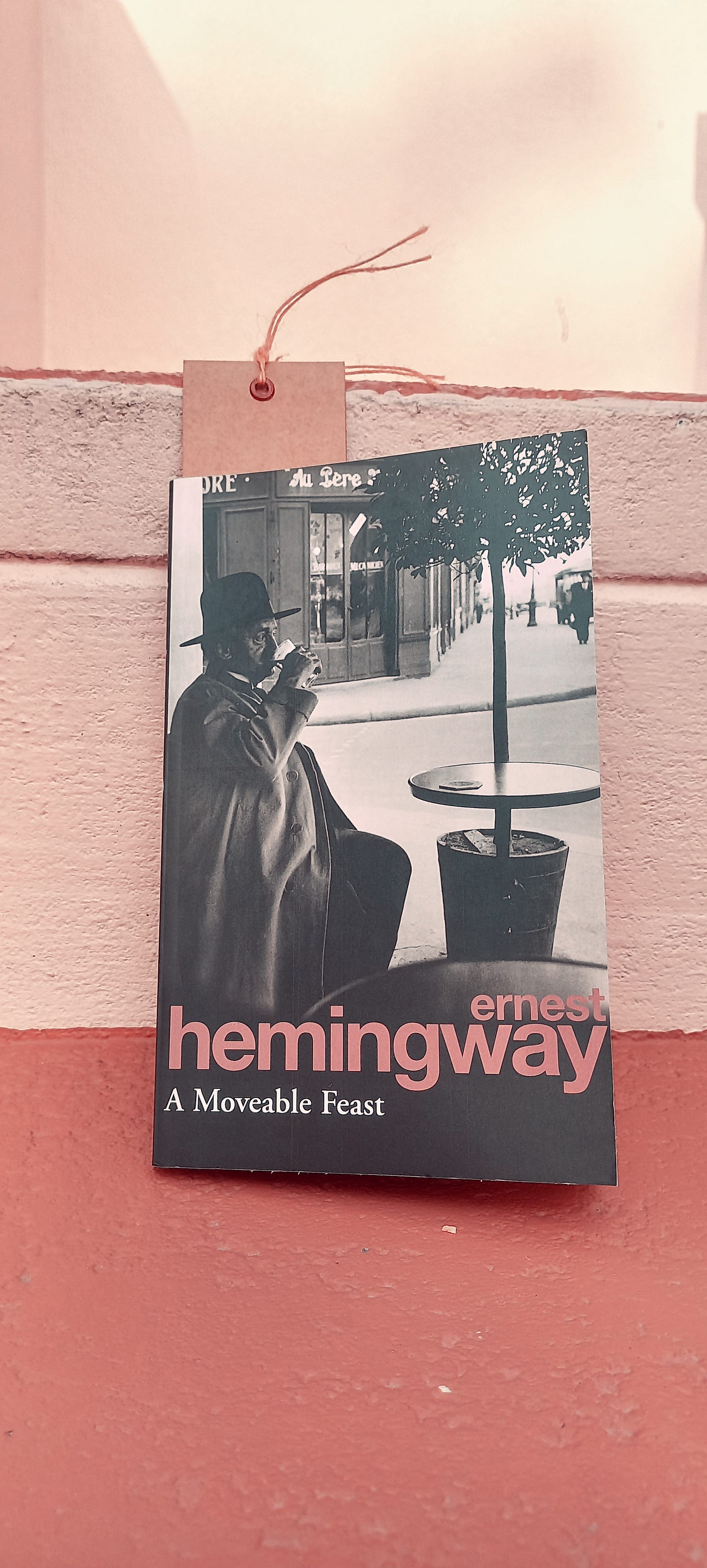There is no other author who causes a great level of conflict, in my opinion, like Ernest Hemingway. The walls of my house have heard countless times the praise of his simple prose, yet I turn a deaf ear when I am told- "Keep it simple". Hemingway's matter-of-fact style clashes with my dreamy head full of figurative narratives. While my brain appreciates the brevity, my soul searches for circuitous scenic getaways. Nonetheless, brevity meets perfection in this tiny unassuming book, an utterly delectable read.
A Moveable Feast is a memoir, Hemingway's recollection of events that happened during his stay in Paris in the 1920s. Paris was the epicenter of creative activities, flocked by writers, poets, and artists around the world. It's a dream to be a part of Une Génération Perdue - "The Lost Generation" that created various artistic movements, including Surrealism which I wholeheartedly idolize. I would love to travel back in time just to be a fly in the wall in the Cafés and salons that congregated these great minds.
Talking about "Time travel" takes me to Woody Allen's marvelous movie -"Midnight in Paris" which sowed the seed of curiosity in me to read "A Moveable Feast". A troubled American screenwriter vacationing in Paris gets magically transported to the 1920s after a Midnight stroll. He meets Fitzgerald, Stein, Hemingway, Piccaso, and Dali to name a few; who inspire his writing and his romantic life. In one of the scenes, Hemingway walks in with a bottle of wine in his hand and grabs a cocktail from another, calling out "Isn't this little Parisian dream a moveable feast". A clever reference to the book which was one of the sources for the story development.
“If you are lucky enough to have lived in Paris as a young man then wherever you go for the rest of your life, it stays with you, for Paris is a moveable feast.” - Ernest Hemingway
True to his style, this petite book has crisp vignettes of his interactions and friendship with Gertrude Stein, Ezra Pound, Scott Fitzgerald, Ford Maddox Ford, Evan Shipman, and brief encounters with James Joyce, Sylvia Beach, and the rest of the literary & art world. These episodes are honest and self-effacing at times, painting a true picture of competition and camaraderie in any profession.
The Battle of Talent Vs Craft
Hemingway mentions more than once his rigid dichotomous opinion on talent vs craft. Particularly in comparison to Fitzgerald's work which he dissects and dismisses as 'talented' and 'lucky'; but whilst describing his writing routine, he carefully points out time spent on 'rewriting' and 'editing'. His audacious commentary on his other contemporary writers like Huxely and Dostoevsky will leave any reader flabbergasted.
Meticulously omitting parts and only highlighting events that are already widely known or the ones that shed a superior light on him is a master stroke. This includes his devout romance with his first wife, Hadley, who accompanied him to Paris and is present throughout the book.
People make the place
Although the book title best describes Paris, the content of the book is more about People than about the place. Paris where people convened, connected, conversed, and above all created masterpieces. Cities act as excellent muses for writers and artists alike. No two artists see the same city the same way. Paris was a medium of creativity for Hemingway, which he aptly acknowledged in his parting words.
"Paris was always worth it and you received return for whatever you brought to it. But this is how Paris was in the early days when we were very poor and very happy" -Ernest Hemingway
Whereas, a few years later, in the same Paris, 500 meters from Hemingway's house George Orwell depicted a poverty-stricken Paris in his memoir "Down and Out in Paris and London". If you would ask me to take a pick between the two, I would unhesitantly choose "A Moveable Feast", any day.
I devoured this book like a gossip column, an insider scoop on the literary conclave in Paris I will never be a part of.
-Preethi



